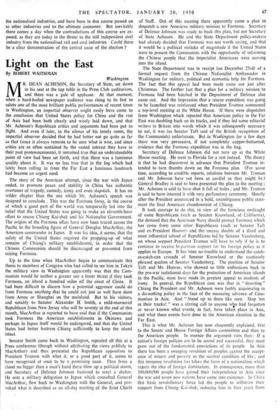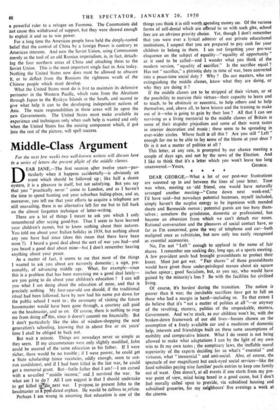Light on the East
By ROBERT WAITHMAN Washington
MR. DEAN ACHESON, the Secretary of State, sat down in his seat at the top table in the Press Club auditorium, and there was a gale of applause. At that moment, when a hard-boiled newspaper audience was rising to its feet to salute one of the most brilliant public performances of recent times in Washington, an impartial observer might easily have come to the conclusion that United States policy for China and the rest of Asia had been both clearly and wisely laid down, and that Mr. Acheson's Republican critics and opponents had been put to flight. And even if later, in the silence of his lonely room, the impartial observer decided that he had better not go quite as far as that (since it always remains to be seen what is wise, and since critics are so often sustained by the vested interest they have in their past pronouncements), it remained true that an understandable point of view had been set forth, and that there was a luminous quality about it. It was no less true that in the fog which had lately been rolling in from the Far East a luminous landmark had become an urgent need.
The story of the American attempt, since the war with Japan ended, to promote peace and stability in China has authentic overtones of tragedy, comedy, irony and even slapstick. It has no wilder chapter than the one which Mr. Acheson's speech was designed to conclude. , This was the Formosa foray, in the course of which a good part of the world was temporarily led into the belief that the United States was going to make an eleventh-hour effort to rescue Chiang Kai-shek and his Nationalist Government. The origins of the Formosa affair have now been traced across the Pacific to the brooding figure of General Douglas MacArthur, the American commander in Japan. It was his idea, it seems, that the safety of the United States required the propping-up of what remains of Chiang's military establishment, in order that the Chinese Communists should be discouraged or prevented from seizing Formosa.
Up to the time when MacArthur began to communicate this thesis to members of Congress who had called to see him in Tokyo the military view in Washington apparently was that the Com- munists would be neither a greater nor a lesser threat if they took Formosa, an island a hundred miles off the coast of China. It had been difficult to discern how a potential aggressor could do from Formosa anything that he could not just as well have done from Amoy or Shanghai on the mainland. But to his visitors, and notably to Senator Alexander H. Smith, a mild-mannered Republican from New Jersey who will be seventy at the end of this month, MacArthur is reported to have said that if the Communists took Formosa the American establishments in Okinawa and perhaps in Japan itself would be endangered, and that the United States had better buttress Chiang sufficiently to keep the island intact.
Senator Smith came back to Washington, repeated all this at a Press conference (though without attributing the views publicly to MacArthur) and thus presented the Republican opposition to President Truman with what it, or a good part of it, seems to have recognised at once to be a promising issue. Thus from a cloud no bigger than a man's hand there blew up a political storm, and Secretary of Defence Johnson hastened to erect a shelter. He sent a military delegation to Japan which consulted General MacArthur, flew back to Washington with the General, and pro- voked what is described as an all-day meeting of the Joint Chiefs
of Staff. Out of this meeting there apparently came a plan to despatch a new American military mission to Formosa. Secretary of Defence Johnson was ready to back this plan, but not Secretary of State Acheson. He and the State Department policy-makers had already decided that Formosa was not worth saving, and that it would be a political mistake of magnitude if the United States were to present the Communists with the opportunity of informing the Chinese people that the imperialist Americans were moving into the island.
The State Department was in receipt (on December 23rd) of a formal request from the Chinese Nationalist Ambassador in Washington for military, political and economic help for Formosa. The fact that this appeal had been made came out just after Christmas. The further fact that a plan for a military mission to Formosa had been hatched in the Department of Defence also came out. And the impression that a rescue expedition was going to be launched was reinforced when President Truman summoned a top-level meeting at the White House. If there were dispatches from Washington which reported that American policy in the Far East was doubling back on its tracks, and if they led some editorial writers in Britain into words which it was subsequently necessary to eat, it was (as Senator Taft said of the British recognition of the Communists) unfortunate. But in Washington for a few days there was very persuasive, if not completely copper-bottomed, evidence that the Formosa expedition was in the bag.
Secretary of Defence Johnson did not turn up at the White House meeting. He went to Florida for a rest instead. The theory is that he had discovered in advance that President Truman in- tended to turn thumbs down on the Formosa plan. (For some time, according to credible reports, relations between Mr. Truman and Mr. Johnson have not been as cordial as they might be.) General Bradley is said to have presented the plan to the meeting ; Mr. Acheson is said to have shot it full of holes ; and Mr. Truman is said to have interred it with very perfunctory ceremony. Shortly after the President announced in a bold, unambiguous public state- ment the final American abandonment of Chiang.
It took courage to do this, in view of the ferocious onslaught of some Republicans (such as Senator Knowland, of California), the demand that the American Navy should protect Formosa which has come from some other Republicans (such as Senator Taft and ex-President Hoover) and the uneasy doubts of a third and most influential school of Republicans led by Senator Vandenberg, on whose support President Truman will have to rely if he is to continue to receive bi-partisan support for his foreign policy as it applies to Europe. It has been no trouble to understand the catch- as-catch-can crusade of Senator Knowland or the cautiously phrased qualms of Senator Vandenberg. The position of Senator Taft and Mr. Hoover, who showed so little enthusiasm back in the pre-war isolationist days for the protection of American islands in the Pacific, must have made its greatest appeal to students of irony. In general, the Republican case was that in " deserting " Chiang the President and Mr. Acheson were feebly acquiescing in a do-nothing policy in the face of the menacing advance of Com- munism in Asia. And " Stand up to them like men. Stop 'em in their tracks! " was a stirring call to anyone wto had forgotten or never known what events, in fact, have taken place in Asia, and what these events have done to the American situation in the Far East.
This is what Mr. Acheson has now eloquently explained, first to the Senate and House Foreign Affairs committees and then to the American people. In essence the argument runs thus: If a nation's foreign policies are to be sound and successful, they must grow out of the fundamental convictions of its people. In Asia there has been a sweeping revulsion of peoples against the accept- ance of misery and poverty as the normal condition of life ; and this immense revolution has taken the form of a nationalism which rejects the idea of foreign domination. In consequence, more than 500,000,000 people have gained their independence in Asia since the war and seven new nations have come into existence. In China this basic revolutionary force led the people to withdraw their support from Chiang Kai-shek, reducing him in four years from
a powerful ruler to a refugee on Formosa. The Communists did not cause this withdrawal of support, but they were shrewd enough to exploit it and so to win power.
For a long time the American people have held the deeply-rooted belief that the control of China by a foreign Power is contrary to American interests. And now the Soviet Union, using Communism merely as the tool of an old Russian imperialism, is, in fact, detach- ing the four northern areas of China and attaching them to the Soviet Union. This is the most important single fact in Asia today. Nothing the United States now does must be allowed to obscure it, or to deflect from the Russians the righteous wrath of the Chinese people which must develop.
What the United States must do is first to maintain its defensive perimeter in the Western Pacific, which runs from the Aleutians through Japan to the Ryukyu Islands in the South, and second to give what help it can to the developing independent nations of Asia. The main responsibilities in these areas will lie upon the new Governments. The United States must make available its experience and techniques only when such help is wanted and only when the United States has the missing component which, if put Into the rest of the picture, will spell success.



































 Previous page
Previous page